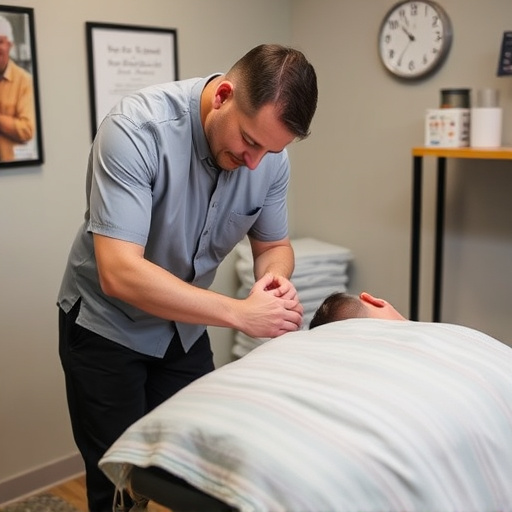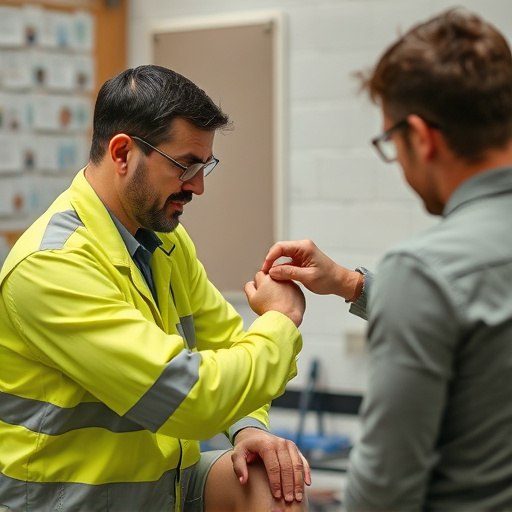An accident injury specialist is a crucial healthcare link in trauma management, assessing and treating injuries from car crashes, slips, falls, and workplace incidents. They coordinate patient care, offer immediate recommendations for pain relief, and ensure holistic treatment addressing physical and emotional aspects. For complex or unique injuries like spinal issues or sports injuries, specialists such as chiropractors, physiotherapists, orthopedists, or sports medicine physicians are referred. Navigating the referral process is vital for effective post-injury care, ensuring patients receive tailored treatments during their recovery journey.
An accident injury specialist plays a pivotal role in ensuring victims receive the best care post-incident. Their expertise lies in assessing injuries, coordinating treatment, and facilitating recovery. This article delves into the critical decisions an accident injury specialist makes when recommending specialist referrals. We explore when such referrals are essential, the process involved, and how it optimizes patient outcomes. Understanding these insights is vital for both patients and healthcare providers navigating complex medical journeys.
- Understanding the Role of an Accident Injury Specialist
- When and Why Specialist Referrals are Necessary
- Navigating the Referral Process for Optimal Patient Care
Understanding the Role of an Accident Injury Specialist

An accident injury specialist is a healthcare professional who focuses on evaluating and managing injuries sustained in various types of accidents, such as car crashes, slips and falls, or workplace incidents. Their expertise lies in understanding the complexities of traumatic events and their impact on the human body. These specialists play a crucial role in coordinating patient care, especially when complex medical treatments are required.
They often serve as the first point of contact for individuals who have been injured, providing immediate assessment and recommendations. This may include suggesting therapeutic exercises tailored to specific injuries, such as those causing neck pain relief, or referring patients to specialists like personal injury chiropractors for further treatment. Their goal is to ensure patients receive comprehensive care that addresses both the physical and emotional aspects of accident-related injuries.
When and Why Specialist Referrals are Necessary

In many cases, an accident injury specialist will recommend specialist referrals when the nature of an injury is complex or requires specialized treatment. This decision is typically made based on a comprehensive assessment of the patient’s condition and medical history. Specialist referrals are necessary when an individual suffers from severe or unique injuries that demand expert attention. For instance, a personal injury chiropractic referral might be advised for patients with spinal or neurological conditions resulting from an accident, as these cases often require specialized adjustments and care.
Moreover, sports injury recovery is another area where specialist referrals prove invaluable. If an athlete sustains an injury during their sport, they may benefit from seeing a physiotherapist, orthopedist, or even a sports medicine physician who can provide tailored rehabilitation strategies. Post-injury care is crucial for ensuring patients receive the most effective treatments and supporting them throughout their recovery journey.
Navigating the Referral Process for Optimal Patient Care

Navigating the referral process is a crucial step in ensuring optimal patient care for individuals involved in accidents. When an accident injury specialist recommends specialist referrals, it’s important to understand this as a gateway to comprehensive wellness care. The initial assessment by the specialist identifies specific areas of concern and injuries sustained, prompting them to connect patients with relevant medical professionals who specialize in these fields. This collaborative approach facilitates a more tailored and effective treatment plan, encompassing both physical and emotional recovery needs.
Understanding the referral process involves recognizing the role of various healthcare providers, from primary care physicians to specialists like physiatrists, chiropractors, and physiotherapists. Each professional brings a unique skill set designed to address distinct aspects of injury rehabilitation. Effective communication among these practitioners is key, ensuring continuity in care as patients progress through different stages of recovery. This seamless transition contributes significantly to successful injury rehabilitation and a patient’s overall wellness journey.
An accident injury specialist plays a crucial role in patient recovery by coordinating specialized care when necessary. Understanding when and why specialist referrals are required is essential for optimal patient outcomes. By navigating the referral process effectively, healthcare providers can ensure patients receive the best possible treatment, fostering a comprehensive and efficient recovery journey.














